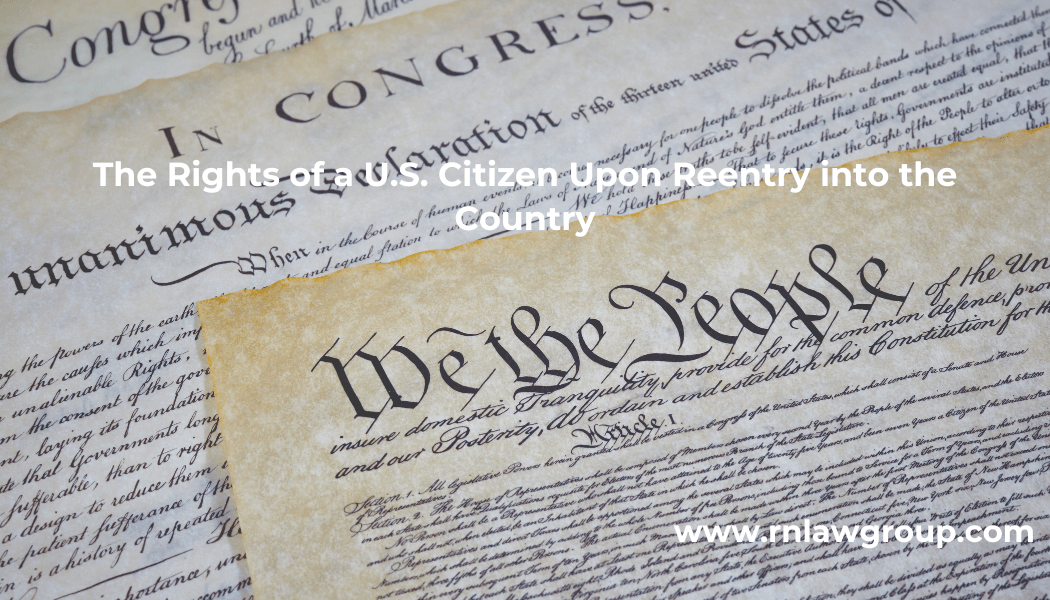
The Rights of a U.S. Citizen Upon Reentry into the Country
Reentering the United States as a U.S. citizen should ideally be a simple and secure experience. One of the absolute rights associated with U.S. citizenship is the unequivocal right to return to one’s homeland. However, uncertainties often arise regarding the legal protections available at the border, the nature of permissible questioning, and the extent of authority held by U.S. Customs and Border Protection (CBP) in inspecting returning citizens. While CBP officers possess significant power to enforce immigration and customs regulations at entry points, the U.S. Constitution guarantees certain rights that are upheld even at the border.
Central to these protections is the absolute right of a U.S. citizen to return to their country. This right is unequivocal. No matter where an individual has traveled, the duration of their absence, or their personal or legal background, a U.S. citizen cannot be denied entry into the United States. This principle is supported by both statutory and constitutional law. A landmark Supreme Court case, United States v. Wong Kim Ark (1898), established that citizenship includes the right to reenter the nation. Unlike lawful permanent residents or visa holders, U.S. citizens are exempt from admissibility criteria. Consequently, even if a U.S. citizen lacks proper documentation or is subject to further questioning, the government is obligated to permit their entry once their citizenship is verified.
Upon reentering the country, all individuals, including U.S. citizens, must undergo inspection by Customs and Border Protection (CBP) officers. This procedure is designed to confirm identity and ensure adherence to customs regulations. U.S. citizens, however, possess certain rights during this process. Notably, they have the right to remain silent. While CBP officers may pose questions to establish identity, citizenship, and travel history, citizens are not obligated to respond to inquiries that do not pertain to these matters. This includes questions regarding political views, religious beliefs, or opinions on governmental issues. Citizens may choose to decline to answer such questions, although this may lead to delays or increased scrutiny.
Another frequently asked question concerns the right of U.S. citizens to have legal representation during the inspection process. The answer varies based on the nature of the encounter. In a standard customs and immigration inspection, there is no entitlement to legal counsel. However, if the situation escalates to a custodial interrogation or if the individual is formally detained, the right to an attorney under the Fifth and Sixth Amendments becomes applicable. In such cases, a citizen may request legal representation and should not be questioned further without their attorney present.
Having the appropriate documentation greatly facilitates the reentry process. The most reliable and widely accepted form of identification is a U.S. passport. In certain situations—such as land or sea travel from Canada, Mexico, or the Caribbean—a U.S. passport card or an Enhanced Driver’s License (available from select states) may be adequate. Trusted traveler cards, like those from Global Entry, SENTRI, or NEXUS programs, can also expedite entry but should be accompanied by a passport. If an individual lacks documentation, CBP can still verify citizenship through alternative methods; however, this will likely lead to delays and more thorough questioning. Nonetheless, once citizenship is verified, the individual must be allowed entry.
A significant area of legal and public concern pertains to the searches of personal belongings and digital devices. The Customs and Border Protection (CBP) agency possesses extensive authority to perform warrantless searches at the border, which encompasses luggage, vehicles, and electronic devices such as smartphones and laptops. Courts have affirmed that the Fourth Amendment’s warrant requirement is not fully applicable at the border due to the government’s heightened interest in national security and customs enforcement. Nevertheless, this authority has its limitations. CBP differentiates between “basic” and “advanced” searches. A basic search entails examining the content of a device without the use of external tools and does not necessitate any suspicion. Conversely, an advanced search may involve the use of forensic software or the examination of encrypted or cloud-stored data, and generally requires reasonable suspicion along with supervisory approval.
U.S. citizens are not legally obligated to unlock their devices or disclose passwords. However, refusal to do so may result in consequences such as the confiscation of the device, extended inspection, or temporary detention. It is crucial to note that CBP cannot deny entry based solely on a refusal to unlock a device. Travelers concerned about digital privacy should familiarize themselves with these policies and carefully consider the risks associated with noncompliance.
Another area requiring compliance from citizens involves customs declarations. Upon reentering the country, all travelers, including citizens, must declare items such as currency exceeding $10,000, agricultural products, alcohol, tobacco, and firearms. Failing to accurately declare these items can lead to fines, confiscation, and possible criminal prosecution. While the right to enter the country remains intact, breaching customs regulations can have serious repercussions and should be approached with caution.
CBP may direct individuals to undergo what is referred to as “secondary inspection,” an additional screening procedure that usually occurs in a designated area of the port of entry. This does not necessarily indicate any wrongdoing; rather, it may result from random selection, incomplete travel records, or a name match with a watch list. During secondary inspection, travelers might be subjected to more in-depth questioning, have their personal items or electronic devices inspected, or be temporarily detained for further evaluation. The duration of this process can vary, lasting from a few minutes to several hours, depending on the circumstances. As long as the intent is to confirm identity or adherence to customs regulations, CBP is authorized to perform these inspections. However, extended detentions or invasive searches without proper justification may raise constitutional issues.
Naturalized citizens and individuals born abroad to American parents may face additional scrutiny if there are uncertainties regarding their documentation. In such instances, it is crucial to present a U.S. passport instead of relying solely on a naturalization certificate or consular report of birth abroad. CBP may inquire about naturalization details, travel history, or other relevant information, but they do not have the authority to revoke citizenship or deny entry based on subjective assessments. If the documentation is valid, the individual must be permitted to enter.
Regrettably, certain groups of citizens—especially Muslim Americans, individuals of color, and those with Middle Eastern or South Asian heritage—have reported experiencing excessive scrutiny. This situation has given rise to claims of racial and religious profiling at border checkpoints. Although such actions are unconstitutional and violate CBP policy, the enforcement and oversight of these practices are often inconsistent. Citizens who feel they have been unfairly targeted due to their identity are urged to submit complaints to the Department of Homeland Security’s Office for Civil Rights and Civil Liberties or utilize the DHS Traveler Redress Inquiry Program (TRIP). Organizations such as the American Civil Liberties Union (ACLU) and the Electronic Frontier Foundation (EFF) provide resources and may assist individuals in seeking legal remedies for unlawful or discriminatory treatment.
When traveling with children, especially without one or both parents, it is often necessary to present additional documentation to prevent delays. While U.S. citizen children possess the same right to reenter the country as adults, CBP remains vigilant in detecting potential instances of child abduction or trafficking. It is recommended to carry the child’s U.S. passport and, if relevant, a notarized letter of consent from the absent parent. In cases where guardianship is questioned, officers may request supporting documents such as birth certificates or custody agreements.
Participating in programs like Global Entry can facilitate quicker customs and immigration processing for U.S. citizens. These programs cater to pre-screened, low-risk travelers and enable expedited clearance at specific airports. Although this membership provides convenience, it does not exempt travelers from CBP authority. Membership can be revoked if a participant breaches customs regulations or is flagged for suspicious activity. Even those enrolled in Global Entry may still face secondary inspections or random screenings on occasion.
It is important to recognize that citizens have the legal right to decline to answer questions or submit to certain searches at the border. However, exercising this right may lead to prolonged questioning, delays, or temporary seizure of belongings. Citizens are encouraged to assert their rights in a respectful manner. A straightforward declaration such as, “I am a U.S. citizen and do not consent to this search,” is adequate. Maintaining composure and politeness is often the most effective approach to prevent the situation from escalating.
If a U.S. citizen feels that their rights were infringed upon during reentry, there are several avenues for recourse. It is advisable to document the incident, noting the time, location, names of the Customs and Border Protection (CBP) officers involved (if possible), and the specifics of the encounter. Complaints can be submitted to the CBP, the Department of Homeland Security (DHS), or through the DHS Traveler Redress Inquiry Program (TRIP). In instances of unlawful searches, undue detention, or discriminatory behavior, consulting an attorney or contacting organizations that focus on border rights and civil liberties may be beneficial.
In summary, while U.S. borders are areas of increased authority for immigration and customs enforcement, citizens maintain essential legal protections. The government cannot prevent a citizen from reentering the country under any circumstances. Although CBP officers have the authority to question and search travelers, there are limits to this power, especially concerning constitutional rights. Being aware of your rights, carrying the necessary documentation, and knowing how to react in difficult situations can facilitate a smoother reentry process and help protect your civil liberties.
By: Karim Jivani
Karim Jivani is an Associate Attorney at Reddy Neumann Brown PC who focuses on employment-based non-immigrant visas. Karim’s practice covers all phases of the EB-1A and EB-2 NIW visa process including filing petitions, responding to Requests for Evidence (RFE), and drafting motions and appeals. Karim has also worked on all aspects of H-1B, L-1, I-140, and VAWA petitions.

